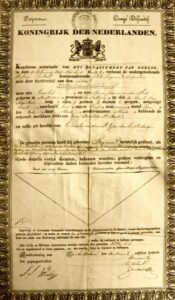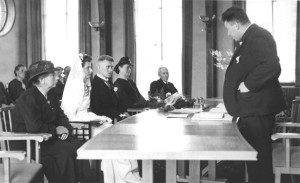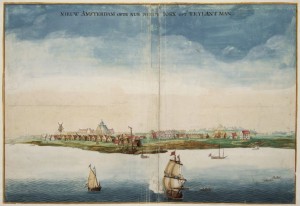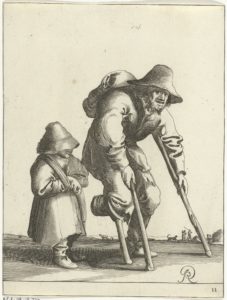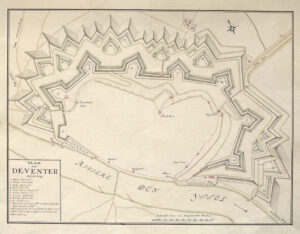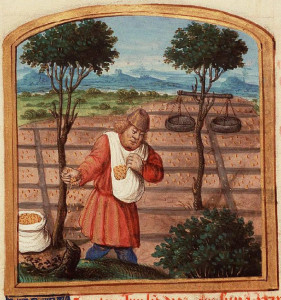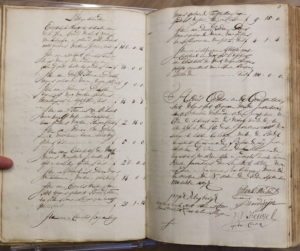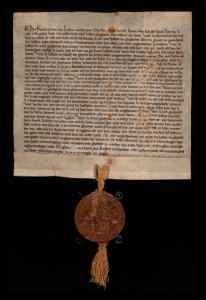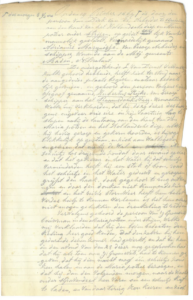Reader Freddy Walhof asked me about the practice of military passports in the 1800s. In the military service record of an enlisted man, the column for end of service said "gepasporteerd" which means "passported." Freddy wondered if an actual passport was issued or if this was an administrative term only. At the end of service, enlisted men were issued a military passport. This contained an extract of their service record, including that they had fulfilled their military duties. Since these … [Read more...]
Dutch term – Tegenwoordig, tegenwoordigheid
Tegenwoordig means present. Tegenwoordigheid means presence. You may come across the term in official documents. For example, a civil registration marriage record may mention that the bride's parents were hierbij tegenwoordig [hereby present], and consented to the marriage. Or you may find a notarial record that was signed in the tegenwoordigheid of two witnesses. … [Read more...]
Quick tip – Identical place names in New and Old Netherland
If you are doing in New Netherland, the Dutch colony in what later became New York and the surrounding area, you may come across place names that exist in both the (old) Netherlands and New Netherland. When you come across a place in records and you cannot find the person in the records of that town, consider that perhaps the other place is meant. For example, a New Amsterdam marriage record may refer to a bride from "Vlissingen" without specifying whether that is the town on Long Island or the … [Read more...]
Dutch term – Domicilie van Onderstand
The domicilie van onderstand (literally: domicile of support) is the place of settlement with regards to poor relief. The Poor Law of 1818 provided nation-wide legislation for the place of settlement. The place of settlement was the place of birth, until someone lived in another place for at least four years and paid taxes there. The municipality where the person was living provided the relief, to be reimbursed by the municipality of birth if that was determined to be the place of settlement. … [Read more...]
Dutch Genealogy News for August 2023
Here are all the new sources, projects, and other news announced in the past month. Sources Hattinga's atlas of Gelderland, Overijssel, and Groningen from the 1740s has been digitized and can be consulted at the website of Collectie Overijssel. Cause of death notes from the east of North Brabant have been digitized and indexed. Check the index at the BHIC website. Verdicts of the Court Martial in 's-Hertogenbosch 1839-1919 have been indexed and scanned. See the BHIC website. Guid … [Read more...]
Dutch term – 7ber, 7bris
In old records, you may find the word 7ber or 7bris for the month. This means "september" [Dutch] or Septembris [Latin]. The names of the months were established when the start of the year was in March and September was the seventh month. Do not confuse 7ber for July, the seventh month of our current calendar. … [Read more...]
Source: Estate Inventories
Estate inventories tally the assets and debts of a person, family, or company. They were typically created for people of means. You are unlikely to find them for poor ancestors. Different regions have different customs, but in general, you are unlikely to find them before the 1600s, though you may find earlier examples. The most important reasons for creating an estate inventory are: ensuring the rights of minor heirs after a parent died. documenting what a spouse brought to a … [Read more...]
Dutch term – Perkament
Perkament is parchment. In the Middle Ages, parchment was the main surface for writing. It was created from animal skin, such as sheep or calf skin. Many medieval chronicles and charters were written on parchment. Gradually, parchment was replaced by paper for most types of writing, first created from textile and later created from wood. Charters kept being written on parchment, but were becoming less common. Nowadays, parchment and charters are rarely used, unless for ceremonial purposes. … [Read more...]
Quick tip – No marriage license or bond
In the Netherlands, there are no marriage licenses or marriage bonds like you may be familiar with in other countries. The only way to get married was to have banns read, typically for three consecutive weeks. That gave others the opportunity to raise objections, for example if one of the parties was promised to another, or if the couple was too closely related. In extraordinary circumstances, you may find dispensations to have the banns read all on the same day, but that is extremely rare. … [Read more...]
Dutch term – Rapport
A rapport is a report. You may come across rapporten in archival descriptions, for example of archives of authorities. Police archives may include dagrapporten (daily reports). For an example of a police report, see the article about how Adriaan Marijnissen died. … [Read more...]
